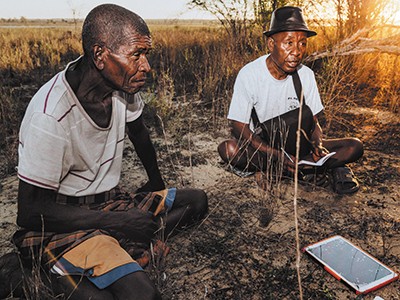
Flood-risk research is among the many science projects that benefit from co-production.Credit: Daniel Dabove/TELAM/Xinhua/Alamy
Few sign up to science for a glamorous lifestyle, colossal salary or generous dental plan. They do it to gain insights and knowledge and, they hope, to make the world a better place. Too often, that last objective proves hard to achieve — not because of uncaring researchers living in ivory towers, but because the way in which some types of study are done and rewarded does not set the correct priorities. That needs to change.
Enter co-production: full involvement in research by people who hope to benefit from the work, in partnership with communities, policymakers and other members of the public. Popular since the 1970s among sociologists as a way to help set inclusive policy, the term — and the principle — is spreading throughout academic science. As we highlight in a special issue this week, a growing number of projects are adopting the approach and working with such groups to jointly carry out research. And ‘jointly’ applies at all stages, from the project’s initial framing through to publication and follow-up.
Nature special: Co-production of research
Co-production can take many forms. Climate scientists, for example, are partnering with farmers to tailor projects to focus on their specific circumstances, such as the changes in precipitation that are likely in a warming world. A World View explores how researchers worked with farmers in northeast Argentina to produce forecast systems for local needs, on the basis of emerging climate models and local knowledge of crop losses.
Clinicians, environmental researchers and many others are coming to appreciate that there are crucial kinds of lived expertise that can improve their studies.
Co-production is less suited to some scientific pursuits, but it can be a powerful way to make results more relevant and practicable across a spread of disciplines. Some call it science that is actionable. At present, too much research done in the name of society is not used by society. Instead it is paid for, produced and dutifully recorded, and then left waiting for someone to come along and use it.
Co-production demands a different approach — from funders, who need to find flexible ways to include and pay for people who work outside academia, to institutions, some of which appoint dedicated staff to negotiate and champion the sometimes-sensitive partnerships required. It needs better incentives: ones that recognize that this work often takes time and doesn’t necessarily lead to high-profile papers and other conventional types of academic success, but can produce outcomes that make a difference in the lives of the people at the heart of the research. Also needed are better ways to analyse and measure the success of co-produced research. Publishers and journals can play a part; in one small step, for instance, Nature’s authorship guidelines state that anyone who had a sufficient role in the work can be included as an author. Most of all, co-production requires individual scientists to see the opportunities and to want to take advantage of them.
The growth in political populism and rising public dissatisfaction with policies some people see as excluding their interests have made it more important for researchers to produce — and to be seen to produce — research that is both beneficial and relevant to society. Efforts to do so are overdue. The onus is on researchers and those who support them to put systems in place to encourage more collaborations.
If ivory-tower scientists did cut themselves off from the problems of the world in the past (and multiple lines of evidence over decades across medicine, engineering, technology, agriculture and dozens of other fields suggest that many did not), then few can get away with such an attitude now. Grant applications and project assessments ask for explanations of the work’s probable societal impact, and commercial funding frequently comes with a desired application as a goal.
Co-production is better for society. It also leads to better research — both technically, because it accounts for more factors, and ethically, because it’s more equitable. That means it increases the chances of genuinely making the world a better place, because what emerges will be more suitable for take-up. That’s something that everyone who cares about research can sign up to.

 Nature special: Co-production of research
Nature special: Co-production of research
 Farmers transformed how we investigate climate
Farmers transformed how we investigate climate
 How three research groups are tearing down the ivory tower
How three research groups are tearing down the ivory tower
 Co-production from proposal to paper
Co-production from proposal to paper
 Craft metrics to value co-production
Craft metrics to value co-production




